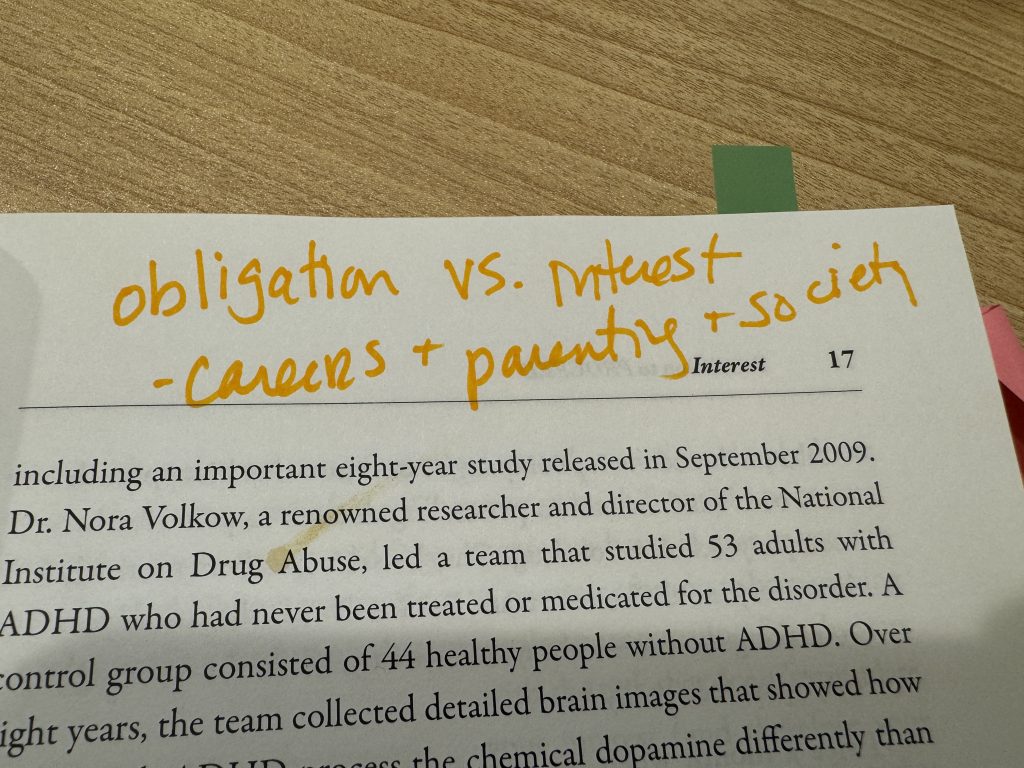
Careers, when aligned, are made of dynamic, interesting, growing experiences. Jobs, when aligned, can be satisfying opportunities to earn a living… but even a dream job requires you to do stuff you dislike.
Take me for example: I’m not interested in every part of my job. I don’t particularly love selling tickets to events and I get enormously cranky at accounting software or the Virginia Tax Board. But as a small-business owner, I accept that there will always be boring stuff that needs to get done.
This is why I was thrown when, earlier this year, I encountered an unexpected definition of ADHD during a coach training:
“ADHD is a deficit, or challenge, of interest.”
The author continued: “When a person with ADHD is not automatically engaged with the topic or task at hand, it is going to be very difficult, maybe impossible, for the person to access their ability to pay attention or sustain their focus long enough to understand what has to be done.”
Interest stimulates the release of dopamine in a person’s pre-frontal cortex, the area of the brain most problematic for folks with ADHD. An absence of interest means an absence of stimulation, which means that a disinterested person with ADHD is not bored. It means that their brain’s attention center is literally not activated.
RUH ROH, I thought. What happens if a person with ADHD isn’t interested in their work?
In the margins of my book, I wrote this:

How does an individual with ADHD manage obligations to their workplace, their families, the world around them? If the above is true, an individual with ADHD is going to need powerful tools and structures to keep them focused, even and especially when these obligations don’t sound so fun.
Here are several tips to stay engaged in work and trick your brain into a version of interest:
- Find a buddy. Apparently there’s an entire industry around the concept of body doubling, which means that two or more people work together in person (or on Zoom!) at the same time. The idea is that the presence of others will motivate you, even if you’re working on completely different projects. Some organizations even host hours for virtual coworking but if that’s not the case for you, block an hour on your calendar yourself and share a link with others. Be the influencer!
- Commit to a deadline. You know what’s motivating? NOT WANTING TO GET FIRED. If you’ve been assigned a really important piece of work, prompt your manager to give you a deadline. If the project is too large and unwieldy, carve off a first step and commit to a short-term date. Once your boss knows the due date, it’s harder to fall behind!
- Do difficult work after lunch. You’ve just eaten, maybe you’re even newly-caffeinated! Don’t waste the momentum! If your brain is clear and your body is fed, come back from your lunch break to challenging work that requires focus.
- Change your format. If you’re normally typing on a laptop, switch to your phone. Can you do the brainstorm on paper with markers or colored pens? I got stuck on this blog post a few minutes ago and decided to take my own advice. I stood up, grabbed some whiteboard markers and did a brain dump of ideas, some of which belonged in this piece and some that I’ll save for another time. Then I sat down again and kept going. Win!
- Reward yourself. One of my friends is a professor and when she sits down at the end of the semester to grade final exams, she does it with a bowl of M&Ms at her side. Every time she reads an essay, she gets a candy. After many years, her candy practice is now a fun tradition, which counteracts some of the slog.
Motivation is complex, even if you don’t have ADHD. Since jobs rely on performance and often our most successful colleagues are driven and ambitious, ADHDers can certainly struggle with success. But there’s a silver lining: if a person with ADHD is interested in their work, WATCH OUT. A stimulated, interested brain that can hyperfocus is unbeatable!
Side note: This post would be incomplete if I didn’t share Dani Donovan’s Anti-Planner. Her product is a 300+ page planner full of helpful tips, tools and structures to get stuff done when you don’t feel like doing it. It’s pricey but it’s been invaluable in supporting coaching clients with ADHD. Check it out!
Want to subscribe to Plucky’s monthly newsletter? Give us your deets here: www.beplucky.com/newsletter.